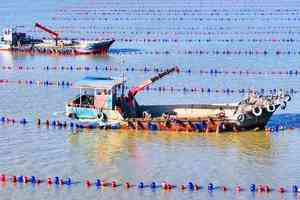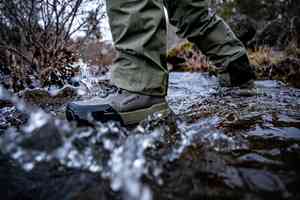Those of us who rely on the outdoors to move us, rehabilitate us or sustain us—whether as anglers, hikers, bikers, kayakers, skiers, rafters, climbers, riders, hunters or so on—represent a gargantuan segment of the U.S. population. We drive billions in consumer spending. We contribute more to our nation's GDP than mega-industries like fossil fuels and agriculture. We create 7.6 million American jobs. And, given our numbers, we have enormous power to leverage at the polls. But we don't use it.
I've been noticing something for the last few years. Sportsmen lose. We lose a lot. Little battles, big battles, skirmishes ... it matters not. At our best—think Pebble Mine—we fight a holding action, giving ground grudgingly, making the other side pay dearly for their gains. At our worst—and our worst is far too common—we smile, vacuous and polite, while the world around us is diminished before our eyes. We seem, at least from where I sit, as if we don't care all that much.
Those words are Todd Tanner's, aged a bit over four years as of this writing. Only they seem truer now than when they were written in 2014. As we head into yet another "most important election of our lives," the only question that remains, it seems, is whether Tanner's words will continue to ripen and mature with age or whether they'll finally skunk and sour.
The answer is up to us. We have the power to alter the results of virtually any race in the country, especially those highlighted here—where margins are so thin that sportsmen and women need only place their finger on the scale and determine the outcome.
We can opt to defend clean, cold rivers and streams; to protect our winters and to preserve healthy habitat for the game we hunt. We can decide to safeguard our access to millions of acres of unspoiled, great wilderness found on public lands owned by all Americans and to advocate for a clean, renewable energy economy that seeks to avoid the most calamitous impacts of human-induced climate change. And we can reject lies and propaganda which tell us that selecting any of these options requires sacrificing our freedom, the health of our economy or our nation.
We can do all of these things. All we have to do is choose. To win.
Texas: Cruz vs. O'Rourke
Let's forget about the fact that Ted Cruz has a reputation for senate absenteeism. And let's forget that Cruz is widely known to be a caustic, unpleasant individual who is disliked intensely even by members of his own party. Donald Trump once quipped of Cruz, "He's a nasty guy. Nobody likes him. Nobody in Congress likes him. Nobody anywhere likes him once they get to know him." Let's just focus on Cruz's record. His environmental record. It's hard to imagine a candidate with a worse environmental record than Ted Cruz.
As a senator in 2017, Cruz voted against policies that would help protect clean water, clean air, curb the use of dirty energy, protect wildlife and wild habitat, address climate change or reduce the use of toxic chemicals an amazing 100 percent of the time, earning him a 2017 score of 0 from the League of Conservation Voters. Cruz's lifetime score, at 3 percent, is almost as dismal.
Cruz is a well-known, unabashed climate change denier who has taken $2.9 million from the oil and gas industry during his time as a Texas senator. That industry's investment has paid off, as Cruz has voted time and time again to benefit the fossil fuel industry at the peril of Texas voters and all Americans. Cruz voted to repeal the Stream Protection Rule which prevented coal and other mining companies from dumping their waste into streams and watersheds. He voted to block protections for the Arctic National Wildlife Refuge, voted for measures to expand offshore drilling and has repeatedly voted against clean energy like wind and solar.
Given Cruz's consistent record of voting against virtually every senate effort to protect clean water, air and landscapes, it's no surprise that Cruz made both the LCV's Dirty Dozen and Hatch Magazine's Dirty Dozens list.
Cruz's opponent, Beto O'Rourke, on the other hand has been hailed as "a consistent champion for our right to clean air, water and conservation of public lands." A lifelong Texan, O'Rourke fought tirelessly (and successfully) to protect the Castner Range in western Texas. As a congressman, O'Rourke's record in defense of clean air, water and healthy landscapes has been nearly unassailable, earning him a perfect 100 score from the League of Conservation Voters for 2017 and a lifetime score of 95.

Nevada: Dean Heller vs. Jacky Rosen
Given that incumbent Nevada senator Dean Heller has taken over $1 million in combined campaign contributions from the fossil fuel industry since his first congressional campaign, most Nevadans have likely come to expect exactly what they get from Heller: consistent votes for policies that reduce regulations on extractive industries while imperiling rivers and lakes, air and wild habitat. Just last year alone Heller voted to undo the Stream Protection Rule, to open up the Arctic National Wildlife Refuge to oil and gas drilling, to repeal measures reducing the amount of methane release and waste from drilling operations on public and tribal lands, against an amendment that would require the U.S. Army Corps of Engineers to mitigate project impacts on fish and wildlife and voted for a CRA (Congressional Review Act) repeal that would have resulted in BLM being directed to disregard local input on how to manage public lands.
Thanks to his disastrous 2017 senate voting record, Heller, like Cruz, landed on both LCV's Dirty Dozen and Hatch Magazine's Dirty Dozens list.
The record of Heller's opponent, Nevada congresswoman Jacky Rosen, couldn't possibly contrast more sharply with the sitting senator's. Though Rosen's tenure in congress has been short, her 97 percent LCV score ranks her top amongst senate candidates on this list. During her time representing Nevada's 3rd district in Washington, Rosen has logged just one vote that doesn't jibe with a pro-conservation, pro-public lands, pro-environment and pro-wilderness worldview—her inexplicable vote for the anti-regulation SCRUB Act. The rest of Rosen's record is impeccable and has resulted in Rosen receiving one of the first-ever endorsements from outdoor clothing giant and corporate-responsibility role model Patagonia (the brand also endorsed Jon Tester).

North Dakota: Heidi Heitkamp vs. Kevin Cramer
Heidi Heitkamp has voted to preserve the Land and Water Conservation Fund (our nation's most successful and almost universally beloved conservation program), to protect the Arctic National Wildlife Refuge, to raise over $50 billion for clean energy development and against efforts to sell off America's public lands for resource development. But representing Heidi Heitkamp as a progressive champion of environmental causes would be disingenuous to say the least. Heitkamp isn't anything of the sort. While Heitkamp more often votes on the side of clean water and air, it's not rare for Heitkamp to side with the interests of purveyors of dirty energy, land privatizers and polluters. Heitkamp not only voted to confirm Ryan Zinke to lead the Department of Interior, she voted to confirm the disastrous Scott Pruitt to the helm of the EPA (as well as his equally nefarious replacement, Andrew Wheeler). She even recently voted against tabling an amendment proposed by Utah Senator Mike Lee that aimed to subvert Clean Water Act protections established in 2015 by the Clean Water Rule—an amendment so draconian in nature that it would have rescinded the Clean Water Rule without concern for public input. Mainly a function of Heitkamp's unwillingness to support any environmental-friendly legislation that would hinder North Dakota's enormous fossil fuel economy—mostly centered around coal and the massive Bakken Shale oil and gas formation—Heitkamp's voting record when it comes to issues like clean air, clean water, healthy landscapes and climate change is checkered.
Heitkamp inarguably is, however, a dramatically preferable choice to her challenger, congressman Kevin Cramer. Cramer is one of only two candidates on this list with an environmental voting record more atrocious than that of Ted Cruz. Cramer has the notorious distinction of being the absolute worst.
In fact, review Cramer's voting record in the House and you'll have to go back over 5 years, literally only 12 days into Cramer's career as a congressman for North Dakota, to find the last time he voted in favor of any bill or amendment that could even be loosely considered in defense of clean air, water or landscapes—a 2013 House roll-call vote on an amendment to provide disaster relief in the wake of Hurricane Sandy which also happened to include a provision requiring the Army Corp of Engineers to reevaluate planned projects to include considerations for the impacts of climate change.
In the time since those fledgling days of Cramer's congressional career, he's logged one vote after another in defense of dirty energy and deregulation. Cramer, another unabashed climate change denier who thinks the earth is cooling, wants to expand fracking and drilling on public lands and further relax restrictions on greenhouse gas emissions like methane. Cramer's widely-held reputation as one of congress' most ardent coal, oil and gas proponents is what caused Trump to tap Cramer during his presidential campaign to craft his fossil fuel-enhancing energy policy.
Florida: Bill Nelson vs. Rick Scott
Florida faces an ever-increasing onslaught of climate change-enhanced storms, climate change-caused rising sea levels that are inundating many of the state's biggest and most economically productive cities and towns as well as beach closings and massive fish kills tied to Florida's toxic algae blooms which have reached such epic proportions that they have fixtures in the national news.
Amidst all these crises, Florida's current governor. Rick Scott is running to become Florida's newest senator, hoping to replace incumbent senator Bill Nelson. It's a move that wouldn't seem particularly strange if Scott wasn't considered one of the chief architects of Florida's disastrous water issues.
As governor, Scott banned the words "climate change" from official Florida state communications. He gutted the state's Department of Environmental Protection by making it laughably easy for industry to get environmental clearances to fill in wetlands and drain aquifers (under Scott, permitting time dropped to two days from 44 under previous Republican Gov. Jeb Bush), by slashing funding to the department and state water management districts, by laying off veteran DEP regulators and other employees and replacing them with industry insiders, and by focusing the department's efforts on reducing fines and enforcement actions against Florida polluters (Scott's DEP brought 80% fewer hazardous waste violation cases and levied 90% fewer fines against polluters). Scott also slashed budgets that would have funded Everglades restoration.
Given Scott's pro-polluter, pro-industry record, it came as no surprise when the Tampa Bay Times reported in July that Scott's campaign was the recipient of a "gusher of oil, gas and energy campaign money" from Texas, Oklahoma, Kansas and elsewhere. These industries see in the prospect of a Senator Scott what they saw in Governor Scott: a politician who will disregard the health of water, air, land and his constituents in the name of the relentless pursuit of greater industry profits.
And yet, popular incumbent senator Bill Nelson—who Hatch Magazine's Ted Williams recently hailed as "a fish-and-wildlife hero"—finds himself in a competitive race against the disgraced Scott. Nelson has demonstrated himself to be one of the most ardent defenders of clean air, water and healthy landscapes in the senate and has voted accordingly 95 percent of the time.
Where do voters have a clearer choice on what candidate will serve their states needs than in Florida?
Montana: Jon Tester vs. Matt Rosendale
If there is one place where voters have a clearer choice than in Florida, it might just be Montana. In Montana, incumbent senior senator Jon Tester—who also happens to be a third generation Montana farmer that still tills the land his grandfather homesteaded back in 1912—is facing an insurgent campaign from millionaire real estate developer Matt Rosendale.
Tester, a Democrat, is commonly regarded as atypical of his party. He is often described as a "Bull Moose Democrat" or a "wildcard" due to his willingness to buck his party's consensus and think for himself. Tester is a pro-gun moderate that has occasionally broken with fellow Democrats and conservation-minded voters (confirmation votes for Zinke and Perry, votes in favor of the Keystone XL pipeline) but he has been a staunch advocate of public lands and consistently votes to protect clean air and water and wilderness (earning him a score of 86 from LCV).
Rosendale, in contrast to Tester's lifelong Montana heritage, is originally from Maryland where he made his fortune, moving to Montana slightly more than 15 years ago. That's a fact Tester's campaign has been happy to point out, dubbing Rosendale "Maryland Matt." Rosendale has also been heaped with scorn after calling himself a rancher, prompting Montanans to quickly point out that Rosendale has never owned a single head of cattle. During his time in state, Rosendale has served in the Montana state legislature, during which he was so vociferously anti-environment that the Montana Conservation Voters Scorecard awarded Rosendale scores of 6 percent, 0 percent and 13 percent.
But what Montana voters may find most troubling, given the state's proud public lands heritage, is Rosendale's history of supporting the movement to privatize public lands. During his failed House campaign, Rosendale openly advocated for the transfer of US Forest Service and BLM Lands to the state of Montana for "economic development" by extractive industries, a position which remains deeply unpopular with many Montana voters. So unpopular, in fact, that it caused Rosendale to alter his position before this current campaign. Of public lands in Montana, Rosendale now says "I have listened to [people of Montana] and completely agree." Whether Montana voters believe Rosendale's about face remains to be seen.
In a revealing piece entitled "Did Hell Freeze Over? My Republican Dad Is Voting for a Democrat," columnist Sarah Vowell writes, "Mr. Rosendale, a Maryland native, is such a meanspirited flake that my Republican father, a guy who wants his ashes shot out of a cannon he built from scratch in his backyard gun shop, plans to vote for Senator Tester, a Democrat."
Tennessee: Marsha Blackburn vs. Phil Bredesen
The retirement of Republican Sen. Bob Corker has left a senate seat open in Tennessee this election year, and vying for it are Tennessee congresswoman Marsha Blackburn and former two-term Tennessee Gov. Phil Bredesen.
Outside of Tennessee, Blackburn is perhaps best known for debating climate change with Bill Nye the Science Guy on NBC's "Meet the Press," during which Blackburn was galactically incorrect on all matters of substance, including even grade-school level scientific concepts—a fact which came as little surprise given Blackburn's proud disbelief of both climate change and evolution. Inside the state, however, Blackburn has been a political fixture, representing Tennessee's 7th congressional district for almost the entirety of the last two decades, a district where Blackburn and her almost caricature-like, extremist, far-right politics regularly win reelection in landslide victories. Not only does Blackburn oppose stem-cell research, gay rights, fair and equal pay for women and net neutrality; she espouses anti-intellectualism and anti-science thinking and she even co-sponsored pharma industry-authored legislation that made it harder for the DEA to stop dirty opioid shipments. That legislation eventually became law, which an investigative report by the Washington Post called "the crowning achievement of a multifaceted campaign by the drug industry to weaken aggressive DEA enforcement efforts against drug distribution companies that were supplying corrupt doctors and pharmacists who peddled narcotics to the black market."
Still, anglers, hunters and outdoor lovers should thank Blackburn for her 2012 vote reducing federal subsidies for fossil fuel companies, as well as her 2011 votes in support of a bill for Gulf coast restoration and against one that would have blocked new listings of endangered species. Other than that, however, it is tough to find bright spots amongst Blackburn's more than 300 anti-environment votes during her long tenure in congress. A perusal of Blackburn's record reveals it's been 6 years since Blackburn logged a vote in defense of clean air, clean water, clean energy, wildlife or wild habitat. It will shock absolutely no one to learn, then, that Blackburn has earned a 0 rating from the League of Conservation Voters for the past 5 years running, a slight departure from her dismal lifetime score of 2. In fact, given her sheer volume of anti-environment votes, it's reasonable to suggest that it is Blackburn, not North Dakota candidate Kevin Cramer, that deserves the distinction as the staunchest opponent of clean air, water and healthy landscapes.
Widely viewed as a moderate, southern Democrat, Bredesen was popular enough amongst Tennesseans to win two terms as governor (no doubt partially due to Bredesen being credited with bringing both the Tennessee Titans and Nashville Predator franchises to the state during his time as mayor of Nashville). He was even floated as a possible 2008 presidential candidate due to his across-the-aisle appeal, but turned down the nod. Departing Republican senator Bob Corker, speaking about Bredesen's candidacy, noted that Bredesen was "a very good mayor, a very good governor, a very good business person", and that he had both "real appeal" and "crossover appeal."
As governor, Bredesen established a public-private initiative that preserved 127,000 acres of Tennessee forest on the Cumberland Plateau, an area that was historically subject to vast clear cutting by timber companies. That and other conservation actions during Bredesen's tenure have been applauded by Tennessee sportsmen and outdoor lovers. During Bredesen's decade away from politics, Bredesen has served as chairman of solar energy plant developer Silicon Ranch.

Arizona: Kyrsten Sinema vs. Martha McSally
The LCV recently admonished McSally when announcing her addition to their Dirty Dozen list, noting that "McSally has proven herself to be a friend of Big Polluters time and again. She has consistently voted against the Clean Power Plan, against efforts to grow Arizona's clean energy economy, and against clean air protections — despite Phoenix having some of the worst air pollution in the country. All this earned her a pitiful lifetime score of just 6 percent on LCV's National Environmental Scorecard. And just recently, Arizonans were calling out McSally for failing to address a cross-border sewage leak that impacted residents of Naco. On top of that, during the most-recent Arizona Senate debate, rather than answering questions about the grave dangers of climate change, McSally pivoted to gutter-level attacks on her opponent. Disgraceful."
McSally has also demonstrated near complete allegiance with those that seek to privatize America's public lands for profit and she's repeatedly supported Trump's efforts to undo national monument protections-—even those in Arizona.
Sinema's imperfect record (LCV 80), on the other hand, is vastly preferable to McSally's. In 2017 Sinema voted to protect public lands (against transfer), to preserve EPA funding, against efforts to gut safety reviews of oil and gas pipelines, to preserve the invaluable Stream Protection Rule, to preserve protections on Alaskan wildlife and against an effort to undermine the EPA's ability to protect Chesapeake Bay.
Missouri: Claire McCaskill vs. Josh Hawley
It's not encouraging that incumbent Senator Claire McCaskill has spent the last few weeks doing her best to distance herself from the most progressive members of her party, calling them "knee-jerk" and implying their brand of governance is too extreme for her tastes. Nor is it encouraging that her campaign has avoided mentioning climate change and many other environmental issues. But McCaskill's opponent, short-term state Attorney General Josh Hawley, has worked tirelessly to brand McCaskill as a far-left candidate that sides with "radical environmentalists every time."
But McCaskill's record demonstrates otherwise. While McCaskill has a relatively strong record of voting in favor of clean energy, clean air and water and wildlife protections, she's often broken with her party, typically for economic reasons. For instance, McCaskill voted against cap and trade legislation due to worries that it would increase utility bills for Missourians. And McCaskill voted for the Keystone XL pipeline. Despite the fact that her record as a legislator shows that she lacks anything resembling a radical environmental agenda, McCaskill has been a relatively consistent defender of the environment (76 LCV score) and, for those that care about protecting healthy habitat and wild places, a dramatically preferable choice to her opponent.
Hawley is obsessed with deregulation and reports indicate he has been ineffective in his short tenure as Missouri's Attorney General, running an AG's office in disarray and turmoil. A Times report on Hawley noted that, "Democrats—and even some Republicans—in Missouri have accused him of being a political opportunist uninterested in his official duties as the state's top prosecutor, and the turmoil in the attorney general's office has added to the questions about his leadership skills." Still, one of Hawley's first actions as state Attorney General was to sue the federal government in an effort to overturn the Stream Protection Rule. He cheered Trump's efforts to repeal the Clean Power Plan and he Hawley shuttered the environmental and agricultural enforcement division of his office for "efficiency reasons." In a Missouri electoral landscape that is increasingly seen as polarized and tribal rather than issue-focused, Hawley, like McCaskill, has avoided public discussion of climate change and environmental policy in general. But his record and deregulatory agenda speak for themselves.
The McCaskill and Hawley campaigns are right about one thing. Missouri families and voters and those of us all around the nation that fish, hunt, hike, bike, camp, ski, ride, kayak, climb and so on are tribal. But the tribe we belong to isn’t for Republicans or Democrats. It’s for those of us that love the outdoors—whether a Texas redfish flat, a cold Smoky Mountain native brook trout stream, a Montana aspen grove, Sierra Nevada peaks coated with freshly fallen powder or the sawgrass marshes and mangrove swamps of the Florida Everglades. And this time around, we’re choosing to defend it.
We hate to ask, but ...
Hatch Magazine's independent conservation journalism depends on the support of readers like you. Please consider becoming a Hatch Magazine sustaining member by making a small monthly or one time donation. Your contribution will help fund more of the in-depth coverage you've come to trust.
































Comments
MS Jackson replied on Permalink
Such a disappointment that you have chosen to politicize one of my last remaining sacred spaces. No - I do not agree with with you or the rest of the TU leadership crowd that our sport must be political. But unfortunately you and others of your ilk think its now a requirement. That's fine, as you are are entitled to your opinion and you can choose to run your business in any manner that you like - but to be clear here you drove away one of your biggest fans and that's just not a long term business model that's proven to be successful --
Best of luck
MS Jackson
Jock Conyngham replied on Permalink
Mr. Jackson, I subscribe to Hatch in large measure because of its environmental journalism. Matt Rosendale is campaigning here in Montana today with Sen. Mike Lee (who leads efforts to sell public land in the west), which highlights his recent lie that he had reversed his earlier position and now supports public land. Horse shit. These guys are coming for the places I hunt and fish and make no (or few) bones about it. If the hook and bullet community doesn’t protect what we currently have, it absolutely will be taken away. You are welcome to your opinion, but there’s no hiding from these threats in the west and from the need to enter the political ring. I’m grateful to Hatch for doing the unpleasant, depressing work of environmental journalism.
Jon Tobey replied on Permalink
I was listening to the news today and they were categorizing candidates as "Progressive" and "Conservative." Given the spate of environmental repeals, I was thinking a better terminology might be "Progressive and Regressive."
thighgapmcgilleycuddy replied on Permalink
MS Jackson, you have to live east of the Rockies with that attitude, if your out west then you know, even if you dont want to admit... you cant ignore what's being done anymore no matter what your politics are?
VOTING RECORD, thats all that matters, posing with a 12 gauge or a fly reel aint gonna cut it anymore.
Kirby replied on Permalink
You are way too far Left. I am Right. Bye bye HATCH.
Drew replied on Permalink
We all depend on smart management of our natural resources and economic development. The environmental movement has continually spewed flawed science about global warming and fossil fuels. It’s simply not true. Stop spreading far left opinions in Hatch Magazine and focus on the sport.
Pages